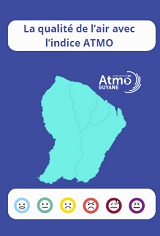Blada.com
dimanche 13 juillet
Boîtes aux lettres
Courrier des lecteurs
Petites annonces
Emploi / Formation
Covoiturage
Infos citoyennes
Infos citoyennes
06/05/22
La surveillance sanitaire à la frontière au cœur des discussions avec le Brésil
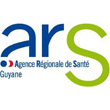 Depuis le début de la semaine, une délégation guyanaise est reçue par ses homologues brésiliens et à l’invitation de la Fiocruz, à Rio de Janeiro, pour renforcer la coopération sanitaire entre la Guyane et l’Amapá. L’un des objectifs est la création d’un centre transfrontalier de surveillance sanitaire.
Depuis le début de la semaine, une délégation guyanaise est reçue par ses homologues brésiliens et à l’invitation de la Fiocruz, à Rio de Janeiro, pour renforcer la coopération sanitaire entre la Guyane et l’Amapá. L’un des objectifs est la création d’un centre transfrontalier de surveillance sanitaire.
Depuis février, le jeudi après-midi, les équipes de la cellule régionale de Santé publique France (SpF) et de la Surintendance de Veille Sanitaire (SVS) de l’État d’Amapá s’échangent des données sur le Covid-19. Les principaux indicateurs liés au Covid-19 y sont précisés : données épidémiologiques, mais aussi taux d’occupation des lits, létalité, couverture vaccinale par commune côté brésilien… C’est l’une des avancées suite à la réunion de coopération transfrontalière qui s’est tenue début février à Cayenne. Alors qu’avant cela, d’autres données étaient partagées entre les deux rives de l’Oyapock sur le paludisme, la grippe ou la dengue, d’autres pathologies pourraient être concernées à leur tour dans les prochains mois. Les deux parties se sont notamment entendues sur la tenue d’un point mensuel pour se partager les situations épidémiologiques et les alertes en cours. « Le jour où il faudra gérer une alerte, cela permettra d’être plus réactif », estime Patrick Rolland, de Santé publique France.
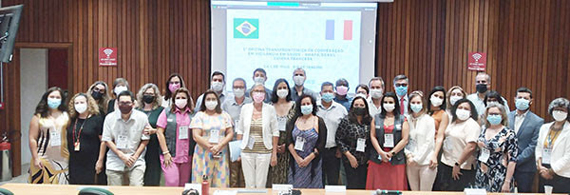
Gestion de crise, formation et recherche au cœur des discussions
Depuis le début de la semaine, les échanges se poursuivent. A Rio de Janeiro, à l’invitation de la Fondation Oswaldo Cruz (Fiocruz, lire ci-dessous), qui assure un soutien scientifique aux discussions. La Pan-American Health Organisation (PAHO) et l’ambassade de France au Brésil, ont participé aux discussions. Trois sujets sont particulièrement au cœur de la rencontre : la gestion de crise, la formation et la recherche. L’un des objectifs, à terme, est la création d’un centre transfrontalier de surveillance sanitaire. « Ces discussions permettent de décider d’actions concrètes, d’un calendrier de déploiement et de ressources à allouer, témoigne Solène Wiedner-Papin, directrice de la santé publique à l’Agence Régionale de Santé. L’un des objectifs est d’avoir un cadre stabilisé avec une gouvernance pérenne. »

« Toutes les planètes sont alignées »
Depuis 1996, la coopération en santé a connu des hauts et des bas, entre la Guyane et son voisin brésilien. « Cette coopération a pris un tournant en novembre, constate Solène Wiedner-Papin. Aujourd’hui, les planètes sont alignées. » En ouverture de cette semaine de discussion, les autorités sanitaires brésiliennes ont rappelé que notre voisin compte « plus de 16 000 kilomètres de frontières internationales avec les pays d’Amérique du Sud (…) Ces flux peuvent influencer la dynamique des maladies sur le territoire national (…) Il est stratégique que les services de santé, en particulier la surveillance, soient préparés à répondre de manière appropriée aux différents événements sanitaires dans ces régions (…) La réponse à la pandémie de Covid-19 a encore renforcé la nécessité d’une meilleure articulation conjointe des stratégies de santé publique. » Connecté à distance, le ministère français des Solidarités et de la Santé, a assuré de son soutien technique, juridique et financier.
Un exercice commun en septembre

« Un des enjeux est d’apprendre à se connaître, de bâtir de la confiance, poursuit Christophe Peyrefitte, directeur de l’Institut Pasteur de Guyane. Par exemple, quand on reçoit des éléments de diagnostic étiologique, il faut que l’on puisse avoir confiance dans le résultat et dans la méthodologie de l’autre. Lors de notre visite du laboratoire de surveillance en santé de Macapá, nous avons découvert une structure avec certains équipements très modernes et d’autres plus anciens mais robustes (…) Il nous faut les conditions pour recevoir en temps réel des informations fiables. » Un calendrier de travail a été défini pour 2022. Il prévoit notamment un exercice commun de gestion d’une alerte sanitaire transfrontalière, en septembre.
Le Fiocruz, « un concentré d’intelligence et de ressources en santé publique »
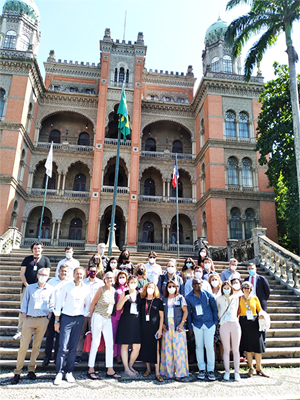 Imaginez un campus de 760 000 m2, dont un tiers arborés, au nord de Rio de Janeiro, une soixantaine de bâtiments parmi lesquels un château de style néo-mauresque abritant un « musée de la vie », un centre de production de vaccins et de réactifs pour les laboratoires de tout le Brésil, l’Institut national brésilien d’infectiologie, une unité de contrôle de la qualité des médicaments, des produits de santé, des aliments, des cosmétiques, des bibliothèques spécialisées dans les sciences biomédicales, la santé de la femme et de l’enfant, la santé publique, un centre d’élaboration et d’évaluation des politiques publiques de santé, un lycée spécialisé dans la formation des techniciens en santé, une rédaction éditant plusieurs revues de santé, une école de santé publique, et depuis mai 2020 un hôpital Covid de 173 chambres, construit en six semaines et ayant reçu les patients atteints de Covid-19 parmi les plus graves. Bienvenue à la Fiocruz, la Fondation Oswaldo Cruz, du nom du microbiologiste qui l’a dirigée de 1902 à 1915.
Imaginez un campus de 760 000 m2, dont un tiers arborés, au nord de Rio de Janeiro, une soixantaine de bâtiments parmi lesquels un château de style néo-mauresque abritant un « musée de la vie », un centre de production de vaccins et de réactifs pour les laboratoires de tout le Brésil, l’Institut national brésilien d’infectiologie, une unité de contrôle de la qualité des médicaments, des produits de santé, des aliments, des cosmétiques, des bibliothèques spécialisées dans les sciences biomédicales, la santé de la femme et de l’enfant, la santé publique, un centre d’élaboration et d’évaluation des politiques publiques de santé, un lycée spécialisé dans la formation des techniciens en santé, une rédaction éditant plusieurs revues de santé, une école de santé publique, et depuis mai 2020 un hôpital Covid de 173 chambres, construit en six semaines et ayant reçu les patients atteints de Covid-19 parmi les plus graves. Bienvenue à la Fiocruz, la Fondation Oswaldo Cruz, du nom du microbiologiste qui l’a dirigée de 1902 à 1915.
Des travaux d’excellence au niveau mondial
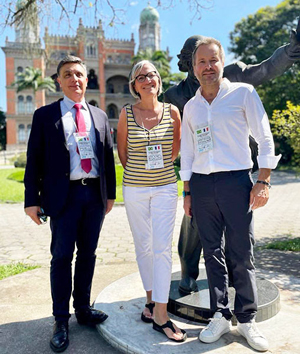 La fondation, où se déroulent les échanges sur la coopération sanitaire entre la Guyane et l’Amapá cette semaine, est aussi l’un des principaux acteurs des échanges. « Au Brésil, c’est l’acteur majeur, historique, de la puissance publique en matière de santé publique, souligne Christophe Peyrefitte, directeur de l’Institut Pasteur de Guyane qui collabore déjà avec la Fiocruz. Dans le cadre de la formation et des relations bilatérales, c’est l’acteur incontournable. Elle a des capacités industrielles de production de vaccin et de tests diagnostiques. Actuellement, elle reçoit une équipe du CDC (Center for Diseases Control, Etats-Unis) pour travailler sur la résistance aux antimicrobiens, un sujet qui lui tient à cœur et où elle a peut-être du retard. Ces travaux sont d’un standard excellent au niveau mondial. » « C’est un incroyable campus, où l’on fabrique des vaccins à deux pas d’un symposium international en immunologie, salue Clara de Bort, directrice générale de l’ARS. Un véritable concentré d’intelligence et de ressources en santé publique. »
La fondation, où se déroulent les échanges sur la coopération sanitaire entre la Guyane et l’Amapá cette semaine, est aussi l’un des principaux acteurs des échanges. « Au Brésil, c’est l’acteur majeur, historique, de la puissance publique en matière de santé publique, souligne Christophe Peyrefitte, directeur de l’Institut Pasteur de Guyane qui collabore déjà avec la Fiocruz. Dans le cadre de la formation et des relations bilatérales, c’est l’acteur incontournable. Elle a des capacités industrielles de production de vaccin et de tests diagnostiques. Actuellement, elle reçoit une équipe du CDC (Center for Diseases Control, Etats-Unis) pour travailler sur la résistance aux antimicrobiens, un sujet qui lui tient à cœur et où elle a peut-être du retard. Ces travaux sont d’un standard excellent au niveau mondial. » « C’est un incroyable campus, où l’on fabrique des vaccins à deux pas d’un symposium international en immunologie, salue Clara de Bort, directrice générale de l’ARS. Un véritable concentré d’intelligence et de ressources en santé publique. »
En tant qu’attaché scientifique et technologique à l’ambassade de France à Brasilia, Nacer Boubenna connaît bien cette institution : « La Fiocruz, c’est un peu le mélange de l’Inserm, de l’ANRS, de l’ARS... Elle a des missions de recherche en biologie, en santé publique, en épidémiologie… Un rôle de vigilance par exemple de la grippe, du zika, de la dengue… Elle dépend directement du ministère de la Santé et a un rôle de formation, même si ce n’est pas une université, ainsi qu’un rôle d’information du grand public. C’est elle, par exemple, qui pendant le Covid a informé le grand public sur les gestes barrières, sur l’intérêt de la vaccination. Elle a une mission pour atteindre les personnes vulnérables : personnes à bas revenu, femmes victimes de violences. Enfin, elle a une mission liée à l’histoire et à la sociologie de la santé, l’histoire des épidémies, de la gestion de la santé… En début d’épidémie de Covid-19, elle a construit un hôpital qui deviendra pérenne et se dirigera vers d’autres pathologies, quand le Covid-19 sera derrière nous. La Fiocruz s’occupe des banques biologiques et, spécificité du Brésil, elle détient des entreprises pharmaceutiques publiques. L’une d’elles fabrique des vaccins contre le Covid-19 en partenariat avec AstraZeneca, et en produisait d’autres avant ; l’autre se charge de la fabrication de molécules et de médicaments, et de leur distribution au SUS, le Système de santé universel. »
Un soutien pour la coopération entre la Guyane et l’Amapá
Dans la lutte contre le Covid-19, la Fiocruz ne s’est pas contentée de construire un hôpital en six semaines, comme le relate cette vidéo (en portugais). Dans la Lettre pro, nous vous avons aussi régulièrement présenté les données épidémiologiques qu’elle produit sur la situation au Brésil. La Fiocruz a produit des vaccins, réalisé des vidéos montrant comment ceux-ci fonctionnent. Dans le cadre de la coopération sanitaire entre la Guyane et l’État d’Amapá, elle pourra apporter ses compétences en matière de surveillance sanitaire, de recherche, de formation des professionnels de santé, d’information à la population et de redistribution vers le système de santé. « Elle pourra par exemple dédier des lignes de production s’il y avait une urgence à traiter », explique Nacer Boubenna.

Deux événements autour de la Guyane et du Brésil
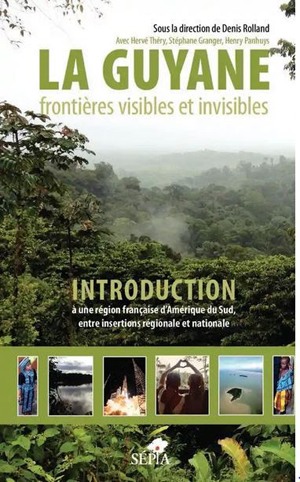 Ceux qui s’intéressent au Brésil pourront suivre deux événements, la semaine prochaine, en présence d’Hervé Théry, directeur de recherche émérite au CNRS et professeur à l’université de Sao Paulo. D’abord mercredi, la présentation de l’ouvrage qu’il a coécrit avec Stéphane Granger : La Guyane, frontières visibles et invisibles (à 18 heures, à la mairie de Cayenne), puis la table rond « Le Brésil à la fin du mandat de Jair Bolsonaro » le lendemain à l’université de Guyane (amphithéâtre A, 17h30). Avant cela, le géographe animera deux événements au lycée Melkior-Garré.
Ceux qui s’intéressent au Brésil pourront suivre deux événements, la semaine prochaine, en présence d’Hervé Théry, directeur de recherche émérite au CNRS et professeur à l’université de Sao Paulo. D’abord mercredi, la présentation de l’ouvrage qu’il a coécrit avec Stéphane Granger : La Guyane, frontières visibles et invisibles (à 18 heures, à la mairie de Cayenne), puis la table rond « Le Brésil à la fin du mandat de Jair Bolsonaro » le lendemain à l’université de Guyane (amphithéâtre A, 17h30). Avant cela, le géographe animera deux événements au lycée Melkior-Garré.
Cet article est issu de la Lettre pro de l’Agence régionale de santé. Vous pouvez vous y abonner en remplissant le formulaire suivant : https://forms.sbc28.com/5a8bed50b85b5350ef1cd117/t13M7zUZQi2XMq5E3DdnhQ/0WQoeDwjRXqJblCpKbLDzA/form.html
 Since the beginning of the week, a Guyanese delegation has been received by its Brazilian counterparts and at the invitation of Fiocruz, in Rio de Janeiro, to strengthen health cooperation between French Guiana and Amapá. One of the objectives is the creation of a cross-border health surveillance centre.
Since the beginning of the week, a Guyanese delegation has been received by its Brazilian counterparts and at the invitation of Fiocruz, in Rio de Janeiro, to strengthen health cooperation between French Guiana and Amapá. One of the objectives is the creation of a cross-border health surveillance centre.
Since February, on Thursday afternoons, the teams of the regional unit of Public Health France (SpF) and the Superintendency of Health Monitoring (SVS) of the State of Amapá have exchanged data on Covid-19. The main indicators linked to Covid-19 are specified there: epidemiological data, but also bed occupancy rate, lethality, vaccination coverage by municipality on the Brazilian side, etc. This is one of the advances following the cross-border cooperation meeting which s is held at the beginning of February in Cayenne. While before that, other data were shared between the two banks of the Oyapock on malaria, influenza or dengue fever, other pathologies could be affected in turn in the coming months. The two parties have notably agreed on the holding of a monthly update to share epidemiological situations and current alerts. “The day when it will be necessary to manage an alert, this will make it possible to be more reactive”, estimates Patrick Rolland, of Public Health France.

Crisis management, training and research at the heart of discussions
Since the beginning of the week, the exchanges have continued. In Rio de Janeiro, at the invitation of the Oswaldo Cruz Foundation (Fiocruz, read below), which provides scientific support for the discussions. The Pan-American Health Organization (PAHO) and the French Embassy in Brazil participated in the discussions. Three subjects are particularly at the heart of the meeting: crisis management, training and research. One of the long-term objectives is the creation of a cross-border health surveillance centre. “These discussions make it possible to decide on concrete actions, a deployment schedule and the resources to be allocated, testifies Solène Wiedner-Papin, director of public health at the Regional Health Agency. One of the objectives is to have a stabilized framework with sustainable governance. »

“All the planets are aligned”
Since 1996, health cooperation has experienced ups and downs between French Guiana and its Brazilian neighbor. “This cooperation took a turn in November, observes Solène Wiedner-Papin. Today, the planets are aligned. At the start of this week of discussion, the Brazilian health authorities recalled that our neighbor has “more than 16,000 kilometers of international borders with the countries of South America (…) These flows can influence the dynamics of diseases in the territory. national (…) It is strategic that the health services, in particular surveillance, are prepared to respond appropriately to the various health events in these regions (…) The response to the Covid-19 pandemic has further reinforced the need for better joint articulation of public health strategies. Connected remotely, the French Ministry of Solidarity and Health, provided technical, legal and financial support.
A joint exercise in September

“One of the challenges is to get to know each other, to build trust, continues Christophe Peyrefitte, director of the Pasteur Institute of French Guiana. For example, when we receive elements of etiological diagnosis, we must be able to have confidence in the result and in the methodology of the other. During our visit to the Macapá health monitoring laboratory, we discovered a structure with some very modern equipment and other older but robust equipment (…) We need the conditions to receive reliable information in real time. A work schedule has been defined for 2022. In particular, it provides for a joint exercise in managing a cross-border health alert in September.
 Fiocruz, "a concentrate of intelligence and resources in public health"
Fiocruz, "a concentrate of intelligence and resources in public health"
Imagine a campus of 760,000 m2, a third of which are planted, north of Rio de Janeiro, some sixty buildings including a neo-Moorish style castle housing a "museum of life", a center for the production of vaccines and reagents for laboratories throughout Brazil, the Brazilian National Institute of Infectious Diseases, a quality control unit for medicines, health products, foods, cosmetics, libraries specializing in biomedical sciences, the health of women and children, public health, a center for the development and evaluation of public health policies, a high school specializing in the training of health technicians, an editorial office publishing several health journals, a health school public, and since May 2020 a Covid hospital with 173 rooms, built in six weeks and having received some of the most serious patients with Covid-19. Welcome to Fiocruz, the Oswaldo Cruz Foundation, named after the microbiologist who directed it from 1902 to 1915.
World-class work
 The foundation, where exchanges on health cooperation between French Guiana and Amapá are taking place this week, is also one of the main players in the exchanges. “In Brazil, it is the major, historic actor of public power in terms of public health, underlines Christophe Peyrefitte, director of the Pasteur Institute of French Guiana who already collaborates with Fiocruz. In the context of training and bilateral relations, it is the key player. It has industrial capacities for the production of vaccines and diagnostic tests. Currently, she receives a team from the CDC (Center for Diseases Control, United States) to work on antimicrobial resistance, a subject close to her heart and where she may be behind. These works are of an excellent standard worldwide. "It's an incredible campus, where vaccines are made close to an international symposium in immunology, greets Clara de Bort, director general of the ARS. A real concentration of intelligence and resources in public health. »
The foundation, where exchanges on health cooperation between French Guiana and Amapá are taking place this week, is also one of the main players in the exchanges. “In Brazil, it is the major, historic actor of public power in terms of public health, underlines Christophe Peyrefitte, director of the Pasteur Institute of French Guiana who already collaborates with Fiocruz. In the context of training and bilateral relations, it is the key player. It has industrial capacities for the production of vaccines and diagnostic tests. Currently, she receives a team from the CDC (Center for Diseases Control, United States) to work on antimicrobial resistance, a subject close to her heart and where she may be behind. These works are of an excellent standard worldwide. "It's an incredible campus, where vaccines are made close to an international symposium in immunology, greets Clara de Bort, director general of the ARS. A real concentration of intelligence and resources in public health. »
As scientific and technological attaché at the French Embassy in Brasilia, Nacer Boubenna knows this institution well: “Fiocruz is a bit like a mixture of Inserm, ANRS and ARS. .. It has research missions in biology, public health, epidemiology… A role of vigilance for example of influenza, zika, dengue fever… It reports directly to the Ministry of Health and has a training role, even if it is not a university, as well as a general public information role. It was she, for example, who during the Covid informed the general public about barrier gestures, about the interest of vaccination. It has a mission to reach vulnerable people: low-income people, women victims of violence. Finally, it has a mission related to the history and sociology of health, the history of epidemics, health management... At the start of the Covid-19 epidemic, it built a hospital which will become permanent. and will move towards other pathologies, when the Covid-19 is behind us. Fiocruz deals with biological banks and, specific to Brazil, it owns public pharmaceutical companies. One of them manufactures vaccines against Covid-19 in partnership with AstraZeneca, and produced others before; the other is responsible for the manufacture of molecules and drugs, and their distribution to the SUS, the Universal Health System. »
Support for cooperation between French Guiana and Amapá
In the fight against Covid-19, Fiocruz was not content to build a hospital in six weeks, as this video relates (in Portuguese). In La Lettre pro, we have also regularly presented the epidemiological data it produces on the situation in Brazil. Fiocruz has produced vaccines, made videos showing how they work. Within the framework of health cooperation between French Guiana and the State of Amapá, it will be able to contribute its skills in terms of health monitoring, research, training of health professionals, information to the population and redistribution towards the health system. “It could, for example, dedicate production lines if there was an emergency to deal with,” explains Nacer Boubenna.

Two events around French Guiana and Brazil
 Those interested in Brazil will be able to follow two events next week, in the presence of Hervé Théry, emeritus research director at the CNRS and professor at the University of Sao Paulo. First on Wednesday, the presentation of the book he co-wrote with Stéphane Granger: French Guiana, visible and invisible borders (at 6 p.m., at the town hall of Cayenne), then the round table "Brazil at the end of Jair Bolsonaro's mandate" the next day at the University of French Guiana (amphitheater A, 5:30 p.m.). Before that, the geographer will host two events at Lycée Melkior-Garré.
Those interested in Brazil will be able to follow two events next week, in the presence of Hervé Théry, emeritus research director at the CNRS and professor at the University of Sao Paulo. First on Wednesday, the presentation of the book he co-wrote with Stéphane Granger: French Guiana, visible and invisible borders (at 6 p.m., at the town hall of Cayenne), then the round table "Brazil at the end of Jair Bolsonaro's mandate" the next day at the University of French Guiana (amphitheater A, 5:30 p.m.). Before that, the geographer will host two events at Lycée Melkior-Garré.
This article is from the Regional Health Agency's Newsletter. You can subscribe by filling out the following form: https://forms.sbc28.com/5a8bed50b85b5350ef1cd117/t13M7zUZQi2XMq5E3DdnhQ/0WQoeDwjRXqJblCpKbLDzA/form.html
Raccourcis


passer une petite annonce

passer une annonce de covoiturage


passer une annonce d’emploi


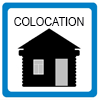


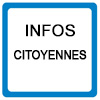

associations, postez vos actualités

participez au courrier des lecteurs
La Guyane c’est ici
La qualité de l’Air avec
ATMO
Photothèque

Lancements 2022
Vol 259 Ariane 5



